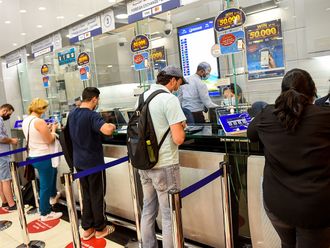![Copy of 451515-01-02 [1]-1681542934275](https://imagevars.gulfnews.com/2023/04/15/Copy-of-451515-01-02--1--1681542934275_18783c4ef13_medium.jpg)
Paris: Inflation rates may be slowing across Europe, but the worst cost-of-living crisis in a generation is still raging when it comes to food.
Bloomberg’s custom food indexes for France and Spain - calculated via the costs for the traditional coq-au-vin and paella dishes - stayed high in March, even as headline inflation slowed considerably.
In the euro area’s second-biggest economy, the monthly gauge - based on data from the national statistics office and the Ministry of Agriculture and Nutrition - revealed that the price of cooking coq-au-vin rose to more than 19 euros ($21.01), a 15.4 per cent rise from a year earlier.
France is Europe’s top chicken consumer and the price of that ingredient jumped by about 18 per cent, while carrots cost 33.5 per cent more than the same month a year ago. Even wine “- which saw the slowest increase of any of the ingredients in the chicken dish “- rose 8.4 per cent, stronger than the country’s 6.7 per cent rate of headline inflation.
Preparing Spain’s national dish, meanwhile, is 18.5 per cent more expensive than a year ago. While that’s a tad slower than the February reading, the jump in the Paella Index, which crunches data from Spain’s National Statistics Institute, compares to a total rate of inflation of just 3.1 per cent.
The price of olive oil surged 32.1 per cent, while vegetables and legume prices rose 27.8 per cent on the year and 5.7 per cent on the month. Rice prices rose 22.1 per cent from a year ago.
Food shortage
With the start of the spring and sunny weather in the coming weeks, Spaniards are likely to want to enjoy this beloved dish more often, though the price may prove prohibitive. It’s also set to stay high as drought-like conditions and rainfall levels at historic lows continue to threaten rice and vegetable crops.
Spain’s Agrarian Association of Young Farmers warned this week that there’s a the risk of an olive-oil shortage by the end of the year at current production and sale rates and that there may be a need to adjust prices. The Spanish rice crop production in 2022 was almost 40 per cent less than a year earlier, the worst in history according to Spain’s largest producer.
Food costs are also likely to stay high in France, where the government has pushed stores to take a hit on margins to keep food affordable.
President Emmanuel Macron’s government negotiated a deal that allows supermarkets to showcase bargains with an official sticker in the colors of the national flag on cut-price essential items. It estimates that companies will take a margin hit amounting to several hundred million euros over three months.
Further west, Spanish Prime Minister Pedro Sanchez, who’s facing elections by year-end, temporarily cut value-added tax on a basket of essential foodstuffs including bread and olive oil.











